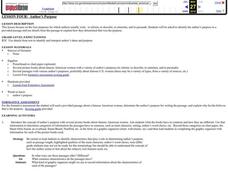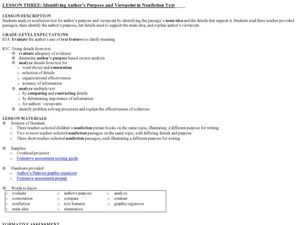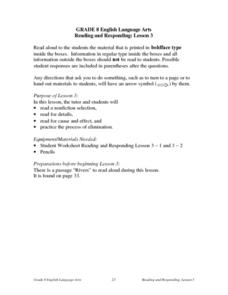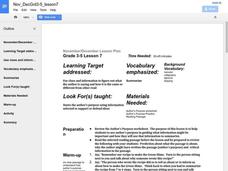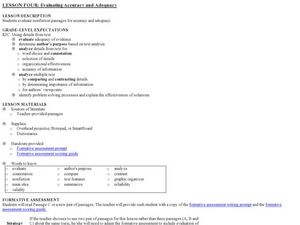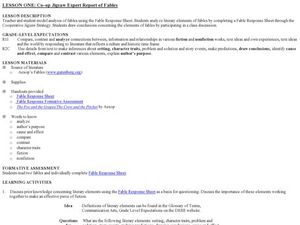Curated OER
Lesson 3: Distinguishing the Author's Purpose
It is true that the more you practice something, the better you'll get at doing it. Lesson three in a three part series on author's purpose has kids venture out to determine the author's purpose in three different passages. They'll read...
Curated OER
Author's Purpose
Readers identify the author's purpose. First, they read a passage and utilize details from the piece to determine the author's purpose. Then they will explain how they arrived at their conclusion. Links to materials are provided.
Curated OER
Identifying Author’s Purpose and Viewpoint in Nonfiction Text
Why do people write books? Pupils discover how to identify the author's viewpoint. They read non-fiction passages their instructor selects (the plan has the class look at nonfiction children's picture books), and then identify the...
Curated OER
Using Details from Text to Identify Author's Purpose
Explore writing techniques by analyzing newspapers and magazines with middle schoolers. They will collaborate in small groups to read local news stories and identify the main ideas and author's intent. They also utilize an information...
Curated OER
Why Do Authors Write?
Sixth graders use short reading passages to identify, explain, and discuss the author's purpose for writing. After a lecture/demo, they utilize a graphic organizer embedded in this plan to organize their writing ideas.
Curated OER
Understanding Cause and Effect
Identify the author's organizational pattern for expressing ideas. After reading an article on the California Gold Rush, middle schoolers determine the author's purpose for writing a passage of informational text. A full list of...
Curated OER
Reading and Responding: Lesson 3
Reinforce comprehension of informational text. This is a one-on-one lesson intended to build an internal dialogue the reader can use to boost overall comprehension. They work independently with a tutor or teacher to read a nonfiction...
Curated OER
Author's Purpose
Fifth graders determine the meaning of author's purpose. For this author's purpose lesson, 5th graders apply the PIE (persuade, inform, entertain) strategy to determine why an author wrote a piece of writing. They examine passages and...
Curated OER
Evaluating Accuracy and Adequacy
Evaluate non-fiction works with your English class. While practicing a variety of strategies detailed in the plan, readers compare and contrast the information in three non-fiction passages about the same topic. They then discuss the...
Curated OER
Lesson 2: Identifying an Author's Purpose (part 2)
Keep reinforcing the concept of author's purpose with a practice activity. After discussing the three purposes of writing, third graders will complete a graphic organizer intended to help them pin point textual evidence that proves...
Curated OER
Lesson Skill: Determining Audience and Purpose
“. . . the car looked as it had caught some terrible disease.” Pairs read and then illustrate a passage from either “The Year I Drove through the Car Wash” or “Riding Is an Exercise of the Mind” in preparation for a discussion of...
Maine Content Literacy Project
Introduction to Short Story Writers Say
There are so many authors of short stories, and your class can have the chance to study quite a few. This seventh lesson plan in a series of fourteen continues the decision-making process for the final assessment: a short story author...
Texas Center for Learning Disabilities
Chapter 11 Teacher Guide and Student Log
As part of their study of the subject of child labor and child abuse introduced by Francesco D’Adamo’s novel, Iqbal, class members examine two extended reading passages about individuals who champion the rights of kids.
Curated OER
Reading And Responding: Lesson 15 Nonfiction
Eighth graders examine a nonfiction selection in a teacher led instructional activity. They examine the author's purpose for writing the selection and identify the difference between fact and opinion. The compare and contrast expository...
University of Virginia
Analyzing Social Commentary in The Adventures of Huckleberry Finn
The Adventures of Huckleberry Finn continues to be one of the most frequently banned books. The satire and social commentary present challenges when using the book as a core text. Direct readers' attention to how Twain uses plot,...
National Math + Science Initative
Reading an Informational Text: "It All Started with Sputnik"
Sputnik was one of the greatest scientific advancements of the 1950s, and this reading lesson does it justice. Pupils start off with pre-reading questions and a video. They then read an excerpt from an article, which is accompanied by...
Curated OER
Post-Colonial Writers Unit
How do cultural and historical background impact thought? To explore this essential question, class members view of portion of the film, The Passage to India, read an excerpt from The Magician’s Nephew, and Nissim Ezekiel’s poem, "In...
Curated OER
Write Right!
After watching part of a Club Write Kids video and discussing the editing process, each group of learners writes a letter to a favorite author. They ask for a copy of a page of manuscript that has gone through the editing process. Prior...
Curated OER
Cooperative Jigsaw Expert Report of Fables
Students research literary elements of fables. In this literature lesson, students analyze literary elements of fables. Students work collaboratively using a jigsaw strategy to analyze literary elements.
Curated OER
Identifying an Author's Purpose
Students read, "Research Shows TV PSAs Effective In Reducing Teen Marijuana Use", discuss the article with questions imbedded in the lesson and write their own PSA.
Curated OER
Peter and the Starcatchers: QAR Strategy
Examine different types of questions while studying Peter and the Starcatchers. After learning about the different types of questions, pupils read passages from the text, answer the questions, and label each question with its...
Novelinks
The House on Mango Street: Question Answer Relationships Strategy
Good readers question text as they read. The Question Answer Relationships Strategy (QAR) used in this resource with The House on Mango Street, provides readers with a concrete approach for questioning Sandra Cisneros' text and...
Curated OER
Literature and History of the Holocaust
Students examine quotes and text passages related to the Holocaust. They generate a list of questions about the Holocaust and analyze a piece of writing based on the authorship of the work. They infer the meaning of a poem and determine...
Curated OER
Formal versus Informal Language
Engage in an activity that focuses on the concepts of formal and informal language use. Middle and high schoolers compare and contrast each style by using a Venn diagram that includes some examples. They read and hear a passage of lyrics...



